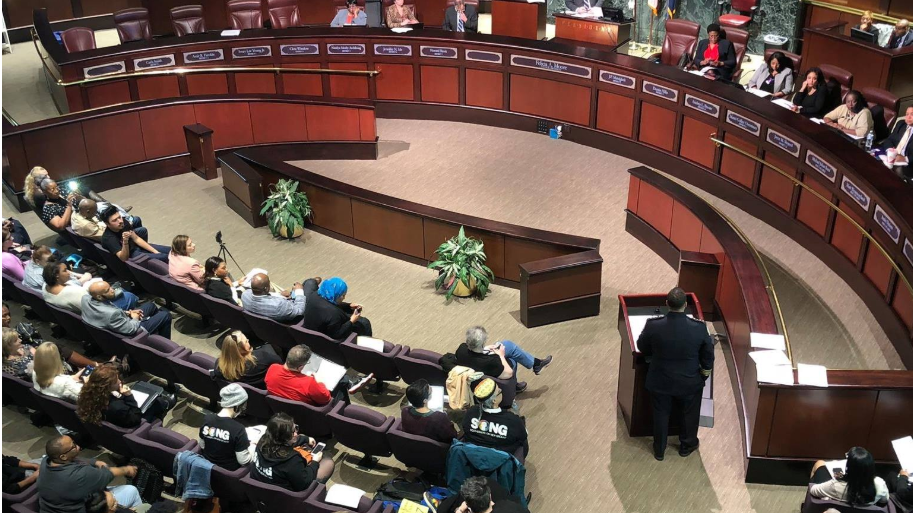on
ATLANTA — The Atlanta City Council unanimously approved legislation Monday finalizing the creation of the Office of Inspector General (Legislative Reference No. 19-O-1729). The ordinance establishes the roles and responsibilities of the office, creates a structure of governance, and requires the provision of funds necessary for facilities, equipment, and staffing. As part of the legislation, three divisions of the City’s government would fall under the Inspector General – ethics, independent procurement review, and compliance. The legislation was introduced by District 6 Council member Jennifer Ide and co-sponsored by District 7 Council member Howard Shook and District 11 Council member Marci Collier Overstreet. Council President Felicia A. Moore – “The Council’s work on this issue has been exemplary and I applaud their spirit of collaboration. The Council members working directly with the administration, along with their remaining colleagues, sent a strong unified message that they are committed to government that is transparent and accountable. Creating an adequately structured Office of Inspector General is one of many steps on the road to cultural reform and the restoration of public confidence. I also commend our constituents for sharing their feedback on this matter and demonstrating the patience necessary for the legislative process to take its course. When stakeholders get involved, a stronger end-result is yielded. I look forward to witnessing comparable effort as the Council continues to address matters legislatively during the second half of this term, including monitoring post-adoption developments as the Office of Inspector General takes shape.” Council member Ide – “This is a constructive, positive step for the city. Finalizing this legislation was a careful and collaborative process and I’m grateful for the support from my colleagues in creating this position to root out waste, fraud and corruption in city government.” Council member Overstreet – “Keeping our city government operating with integrity means being able to report misconduct and know that it will be thoroughly investigated. In establishing this office, we’re putting the framework in place to make sure we’re rooting out any waste and misconduct.” Council member Shook – “Creating the Office of Inspector General moves our City in a positive direction to ensure we’re operating with integrity and transparency. This position will be a true asset to the City, and I applaud my fellow Council members for getting behind this initiative.” The Council also approved legislation to merge the Office of Human Services and the Office of Grants Management to create the Department of Grants and Community Development (Legislative Reference No. 20-O-1140). The structure of the new department will be based on five primary process areas – grant planning, grant program operations, grant administrative services, grant technical services, and administrative support.Additionally, the Council approved an ordinance to enter into Amendment No. 4 of a contract for the management and operation of various tennis centers with Universal Tennis Management to extend the term of the agreement on a month-to-month basis for a period not to exceed six months and to become effective Feb. 11 (Legislative Reference No. 20-O-1031). The Council immediately approved a resolution requesting the Georgia General Assembly to reconsider the reduction of funding for Citizen Advocacy for Atlanta and DeKalb, Inc. in the Fiscal Year 2020 proposed budget and to reconsider the elimination of the total budget funding in the proposed Fiscal Year 2021 budget allocated to the Georgia Advocacy Office. Council members also introduced items for consideration in committee meetings next week including: • A resolution to create the Atlanta Commission on Men and to establish its membership and responsibilities. The commission would serve as an advocate for fathers, men, and boys by advising and making recommendations to the mayor and the Council concerning the needs of Atlanta residents related to and/or concerning fathers, men, and boys.• An ordinance authorizing the City of Atlanta and Invest Atlanta to prioritize funding received via Community Development Block Grants and other sources, financial incentives, and financing options for development projects which include affordable housing within Atlanta for the next five years.• A resolution encouraging the Georgia General Assembly to amend the Georgia Code to add a provision prohibiting landlords statewide from refusing to accept federally subsidized housing vouchers as a source of income for rental housing.• An ordinance to amend the City of Atlanta’s Code to prohibit discriminatory practices in the rental of housing on the basis of legal income.• A resolution establishing the City of Atlanta Task Force for Accessibility and Inclusion to be charged with evaluating accessibility to City Hall, public meetings, briefings and presentations.• A resolution directing the Atlanta Department of Transportation to conduct a study of the process for construction-related road and sidewalk closures, to identify inconsistencies in practices and to update the City’s public right-of-way manual as needed as it relates to road and sidewalk closures.• A resolution requesting a tuition-free, early childhood education be provided for every city of Atlanta child between the ages of 2-4 and to encourage the City of Atlanta to work collaboratively with the Atlanta Independent School System to achieve a tuition-free, full-day early childhood education in the City of Atlanta. Members of the Council also presented proclamations in honor of Reverend Joseph “Rev. Run” Simmons and his wife, Justine Simmons, Melvin Reid, Morris Brown College Day, and Rugby ATL.About Atlanta City CouncilThe Atlanta City Council is the chief policy-making body for the City of Atlanta. It acts by considering and enacting all laws that govern the City. The council also approves the operating and capital budgets for the City as recommended by the mayor, and it continually monitors revenues and expenditures for local government operations. The Atlanta City Council reviews and has final say on many land-use and zoning matters. Major economic development projects for the City also fall under the council’s consideration.
Join our email list to stay connected.






